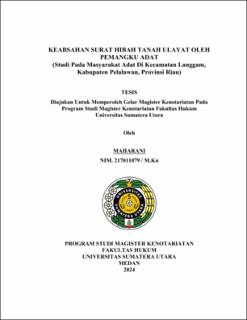| dc.description.abstract | The existence of customary land is inseparable from activities involving the transfer of customary land such as buying and selling, grants, wills, and so on. Granting is where the grantor gratuitously hands something over to the grantee during their lifetime, and cannot be revoked. Granting customary land in indigenous communities in Langgam District is given in writing with proof of a grant letter by the Traditional Leader, raising questions about the validity of such grant letters. This study aims to determine and analyze the existence of customary land in indigenous communities in Langgam District, Pelalawan Regency; the mechanism of granting customary land; and the validity of grant letters for legal certainty for grant recipients.
The research method used is empirical juridical research, which is descriptive analysis, using a legislative approach and conceptual approach. Sampling was done purposively (purposive sampling). Data collection was carried out through field research in the form of interviews and literature studies, with data analysis conducted qualitatively, and deductive conclusion drawing method.
Based on the research results, it was found that there are many customary lands owned by the Pebatinan that have been transferred to communities outside of indigenous communities or companies, indicating the existence of customary land in Langgam District still exists but has diminished and individual rights or ownership rights have become stronger. The granting of customary land in indigenous communities in Langgam District is given by the Batin and done in writing with a Grant Letter from the Traditional Leader. Grant letters by Traditional Leaders, such as in indigenous communities in Langgam District, Pelalawan Regency, are still valid and recognized according to customary law, but cannot yet be used as a basis for land registration, thus not providing legal certainty for grant recipients. Grant Letters by Traditional Leaders serve as initial written evidence for issuing Land Certificates (SKT) from the Village Head/Chief based on Article 24 of Government Regulation Number 24 of 1997.
The recommendations presented in this study are that the Pelalawan Regency Regional Government needs to immediately establish Regional Regulations as a legal basis and determinant of the criteria for the existence of customary land. Traditional Leaders and indigenous communities are expected to continue to preserve the existence and sustainability of their customary land, and there needs to be socialization from relevant stakeholders to customary land grant recipients regarding land administration procedures to ensure legal certainty for grant letters by traditional leaders. | en_US |


